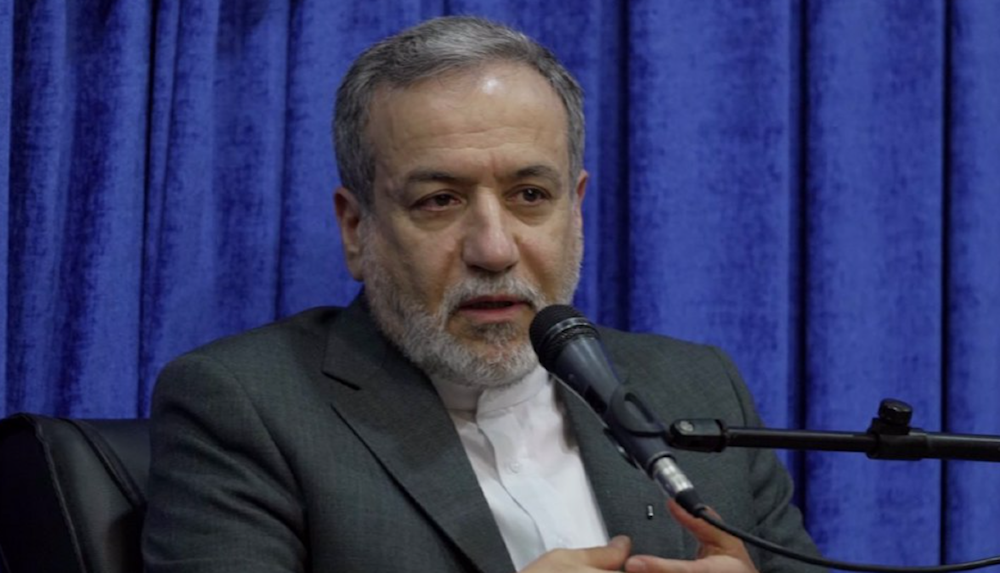Iran renounces 'domination', 'zero enrichment' rhetoric in US talks
Iran’s foreign minister emphasizes that the country’s right to enrich uranium stems from the "mentality and principle of renouncing foreign domination."
-

Iranian Foreign Minister Abbas Araghchi speaks during a visit to Imam Khomeini’s mausoleum in southern Tehran on May 31, 2025 (Social media)
The head of Iran's Atomic Energy Organization (AEOI) has announced that progress has been achieved in the indirect nuclear talks between Iran and the United States.
Mohammad Eslami, the chairman of Iran's Atomic Energy Organization, stated on Saturday that there has been some progress in the continuing indirect talks with the US, while opposing the concept of "zero enrichment", describing such conversations as mere hyperbole intended solely for the Zionist community.
Iran’s foreign minister, Abbas Araghchi, emphasized that the country’s right to enrich uranium stems from the "mentality and principle of renouncing foreign domination."
Days ago, Araghchi responded to growing media speculation over a possible Iran-US agreement, emphasizing that while diplomacy remains Tehran’s preferred path, any deal must fully meet Iran’s conditions, chief among them the complete removal of sanctions and recognition of its nuclear rights.
Speaking at Imam Khomeini’s mausoleum on Saturday, he highlighted that Iran’s foreign policy is grounded in resisting both oppression and domination, as outlined in the first article of the Constitution. This principle, he said, has guided the Islamic Republic since its founding.
He noted that “the statement that you should not carry out enrichment is itself domination. Why shouldn’t we have enrichment? This is absolutely unacceptable to the Iranian nation.”
Iran pioneer in denouncing nuclear weapons
Araghchi emphasized that the Islamic Republic has been a pioneer in denouncing nuclear weapons, and argued that nuclear energy is the "inalienable right of the Iranian people."
In an interview for Oman's state television on Wednesday, President Masoud Pezeshkian stated that Tehran is open to appropriate collaboration aimed at demonstrating the peaceful nature of its nuclear operations, but would not give up its nuclear rights under any circumstances.
Pezeshkian further emphasized that a Fatwa (religious decree) issued by the Leader of the Islamic Revolution Sayyed Ali Khamenei explicitly forbids the Islamic Republic from pursuing nuclear weapons.
Reuters: IAEA claims Iran has undeclared nuclear activity
The International Atomic Energy Agency (IAEA) has issued two new reports on Iran’s nuclear activities, including a comprehensive assessment alleging undeclared operations at multiple sites until the early 2000s.
According to a quarterly report seen by Reuters, Iran’s total enriched uranium stockpile has risen by 953.2 kg, reaching an estimated 9,247.6 kg. The report alleged that 408.6 kg of this stock is enriched to 60% purity, exceeding the IAEA's theoretical threshold (42 kg) for weapons-grade potential if further enriched. Meanwhile, uranium enriched to 20% purity has dropped to 274.5 kg, still more than double the IAEA’s 125 kg benchmark for potential weaponization.
The agency’s second, more detailed “comprehensive” report focuses on three previously undeclared sites, Lavisan-Shian, Varamin, and Turquzabad, which the IAEA claims hosted structured nuclear activities involving undeclared nuclear material until the early 2000s.
“Iran retained unknown nuclear material and/or heavily contaminated equipment… at Turquzabad from 2009 until 2018,” the report reads, noting that materials were later removed from the site.
While the IAEA states it has no credible evidence of an ongoing structured nuclear weapons program in Iran, it expressed concern over repeated past statements by Iranian officials about possessing the technical capability to develop nuclear weapons.
The agency also accused Iran of failing to provide technically credible explanations and of sanitizing suspected sites rather than answering the IAEA’s inquiries.
IAEA Director General Rafael Grossi renewed his call for Iran to fully and effectively cooperate with the agency.
Iran warns E3 against politicizing IAEA report: Exclusive
However, these reports come amid exclusive information that three European countries are intensifying pressure on the IAEA to issue a negative report on Iran’s nuclear program, despite recent signs of diplomatic openness from Tehran.
Sources revealed to Al Mayadeen that this pressure campaign began even before the latest round of indirect talks between Tehran and Washington, and has continued unabated, undermining the potential for constructive engagement.
“Despite Iran’s messages of goodwill, the E3 continue to pursue the path of pressuring the IAEA,” the sources stated.
This comes as Western powers plan to push the IAEA to declare Iran in breach of nuclear obligations, marking the first such move in nearly 20 years, escalating tensions despite indirect talks with the US currently taking place to arrive at a nuclear deal.

 4 Min Read
4 Min Read









